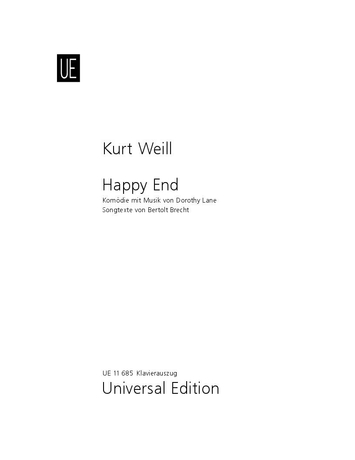.png)
Payments:
Shipping:
Kurt Weill
Weill: Happy End
Libretto von: Bertolt Brecht Dorothy Lane
Übersetzer: Michael Feingold
Herausgeber: Alan Verne Boustead
Dichter der Textvorlage: Dorothy Lane
UE11685
Type: Klavierauszug
Languages: Deutsch | Englisch
Format: 232 x 305 mm
ISBN: 9783702410001
Pages: 124
ISMN: 979-0-008-01669-1
Payments:
Shipping:
Description
In 1929, from the end of May until the beginning of June, Brecht was in Berlin, working amongst other things on Happy End which, in so far as it makes use of the Salvation Army theme, is based on a short story by Elisabeth Hauptmann. Brecht invented the pseudonym “Dorothy Lane” as the author, although Weill insisted that he at least take the credit as writer of the songs. The play received its first performance on August 31st in the Theater am Schiffbauerdamm, the most important roles being played by Carola Neher, Helene Weigel, Oskar Homolka, Peter Lorre, Theo Lingen and Kurt Gerron. The projections and “songlicht” (song-light), as well as Caspar Neher’s sets, emphasised again the anti-naturalistic effects with which Brecht had been experimenting successfully since the Threepenny Opera and the Mahagonny Songspiel. Moments of parody show the “true American fusion of money and salvation”; the unholy alliance of money and religion is treated here in an American milieu and can thus be considered as a social critical prelude to the opera Mahagonny, as well as to St. Joan of the Stockyards.
Musically, Happy End may be characterised by the following features:
- by three different musical levels: the vocal line with orchestral accompaniment, “Sprechgesang” (speech-song), and “In-die-Musik-Sprechen” (speaking into the music);
- by the division of the songs into plot-determined groups of persons, namely the songs of the “Ballhausbande” and the Salvation Army Songs. Aside from this rough division into two seemingly opposite groups, an additional and more exact division may be made between the numbers characterising persons, those relating to situations, and those with no dramatic function; without a doubt Bill and Lilian are the most clearly characterised.
Generally speaking the music derives from two basic vocal forms: the song and the religious song, notwithstanding the incorporation of contemporary dance rhythms, for example Tango, Waltz, Blues and Foxtrott.
Contents
Bilbao Song
Der kleine Leutnant des lieben Gottes
Geht hinein in die Schlacht
Was die Herren Matrosen sagen (1. Akt) Tango
Was die Herren Matrosen sagen (2. Akt) Tango
Bruder, gib dir einen Stoß
Fürchte dich nicht
In der Jugend gold'nen Schimmer
Das Lied vom Branntweinhändler
Der Song von Mandelay
Surabaya-Johnny
Das Lied von der harten Nuß
Die Ballade von der Höllen-Lili
Hosiannah Rockefeller
More information
Type: Klavierauszug
Languages: Deutsch | Englisch
Format: 232 x 305 mm
ISBN: 9783702410001
Pages: 124
ISMN: 979-0-008-01669-1

